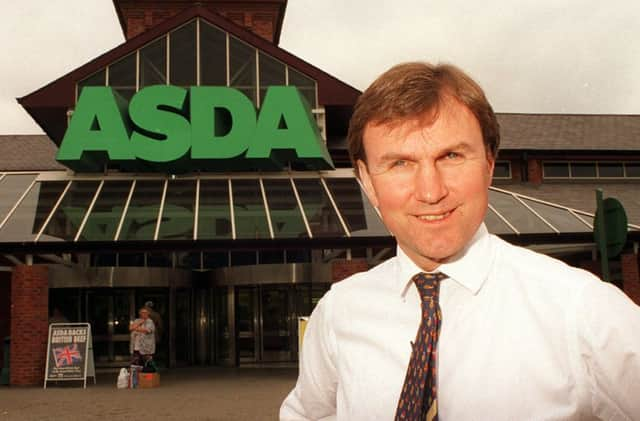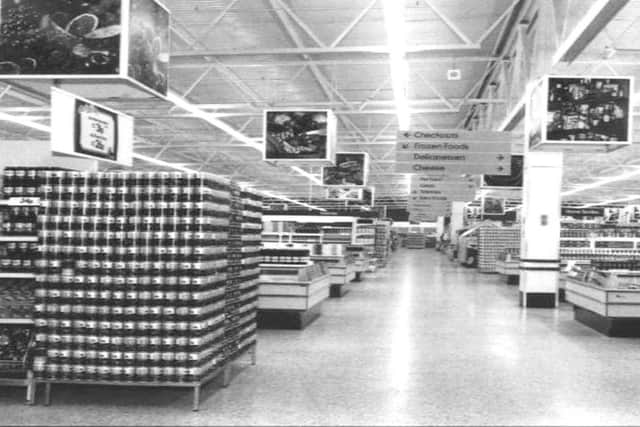Retailing giant that began life down on the farm


Today, Asda is one of the biggest names in the region’s corporate landscape, and its performance is seen as a reflection of the wider fortunes of our country’s grocery market.
Fifty years ago, when the Asda we know today was launched, the commercial world moved at a very different pace.
Advertisement
Hide AdAdvertisement
Hide AdBut, to really understand its heritage, you have to go back to the 1920s, when a group of Yorkshire dairy farmers joined forces to form Hindell’s Dairies in the belief they could achieve better returns by working together.


After a series of acquisitions, the name was changed to Associated Dairies & Farm Stores Ltd in 1949 in Leeds. The adoption of the Asda name occurred in 1965 with the merger of the Asquith chain of three supermarkets and Associated Dairies; Asda is an abbreviation of Asquith and Dairies.
Sir Noel Stockdale, the then chairman of Associated Dairies, was the driving force behind the firm’s development in these early years.
Asda took advantage of the abolition of retail price maintenance to offer large-scale, low-cost supermarkets, aided by the takeover of GEM retail. This expansion included the first out-of-town store in West Bridgford in November 1964. Asda increased GEM’s £6,000 per week sales to around £60,000 per week in just six months with the new stores named ASDA Queens Supermarkets.
Advertisement
Hide AdAdvertisement
Hide AdFor a time in the 1980s, Asda Stores Ltd was a subsidiary of Asda-MFI plc following a merger between the two companies. Other companies in the group were Associated Dairies Ltd, the furniture retailer MFI and Allied Carpets.
After the sale of MFI and Allied Carpets, the company name changed to Asda Group plc.
The dairy division was sold in a management buyout and renamed Associated Fresh Foods, meaning that Asda has no connection with any of the firms that inspired its name.
With stores mainly based in the North of England, the food retail group expanded further south in 1989 by buying the large format stores of rival Gateway Superstores for £705m.
Advertisement
Hide AdAdvertisement
Hide AdThis move overstretched the company, and it found itself trying to sell too many different products.
It revived under the leadership of Archie Norman, who was the chief executive from 1991.
Mr Norman stepped up to become chairman of the company during 1996–99, and remodelled the store along the lines of Asda’s new parent – the world’s largest retailer, Walmart.
He sent his protégé, Allan Leighton, to Bentonville, Arkansas to assess and photograph the systems and marketing methods deployed by Walmart.
Advertisement
Hide AdAdvertisement
Hide AdFollowing the takeover, Asda moved its headquarters to the then newly opened Asda House.
This was one of the first of the new large office blocks to open as part of the redevelopment of southern stretch of the River Aire in Leeds city centre.
1990 saw the launch of the first ever supermarket clothing brand – George, the pioneer of supermarket fashion.
A spokesman said: “Heritage means a lot to us, and the Asda of the future will continue to build on the heritage we have, thanks to a group of farmers who started the business 50 year ago.”
Advertisement
Hide AdAdvertisement
Hide AdIn 2005, Asda’s chief executive, Tony De Nunzio left, and was replaced by Andy Bond.
In 2005, Asda expanded into Northern Ireland by purchasing 12 former Safeway stores from Morrisons.
In May 2010, Andy Clarke, a former manager of an Asda store and then-chief operating officer, was appointed as CEO.
In the same year, Asda bought all of Netto’s UK operations in a £778m deal. The deal provided the company with smaller, more localised stores, with most Netto outlets being only one fifth the size of the average Asda supermarket. The rebranding of Netto stores to Asda began in early 2011.